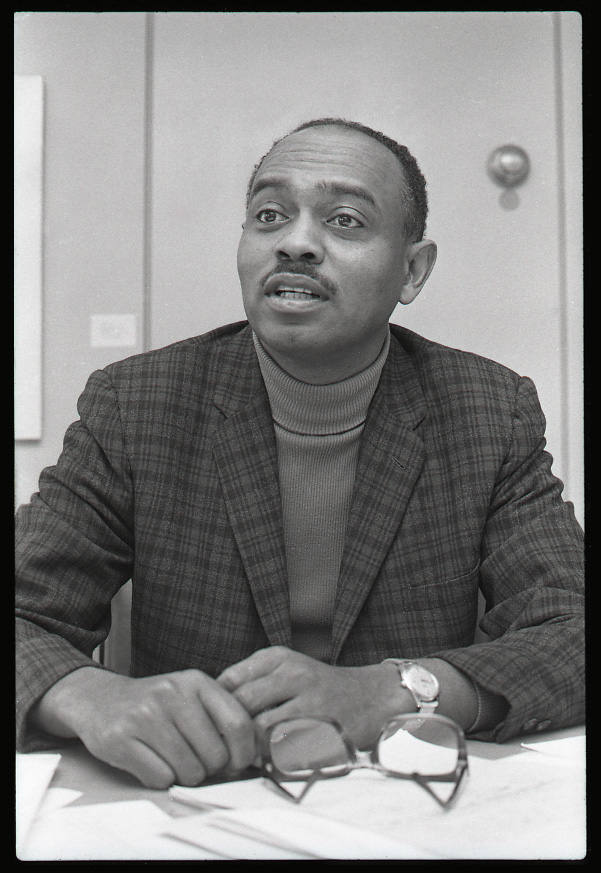Background on Frederick Tillis

Fred Tillis, Nov. 23, 1977
Frederick Tillis - a composer, performer, poet, educator, and arts administrator - profoundly shaped the Music Department at the University of Massachusetts Amherst, influenced the direction of contemporary jazz, and used a wide range of cultural references throughout his career in the arts. As a performer and composer of unusual breadth, his work spans both the jazz and European traditions, with pieces written in piano and voice, orchestral, choral, chamber, and the African American spiritual tradition.
Born in Galveston, Texas, in 1930, Tillis became involved with music at an early age. He began to play jazz trumpet and saxophone before his teens, playing trumpet professionally at age 12, earning the nickname "Baby Tillis" and quickly connecting with jazz. Early inspiration came from a visit to the Symphony Orchestra of Houston and from classical composition "Peter and the Wolf," an experience he noted in a 2010 interview. His early musical endeavors focused on piano and trumpet, later expanding to wider orchestral arrangements.
Tillis began a degree in Music at Wiley College, a private historically black college, when he was only 16 and graduated with his Bachelor’s at age 19. While enrolled, he was hired as assistant to the music professor, being promoted to the position in his third-year after the professor's dismissal and becoming one of three members of the school's music department. In 1950, he married Edna Louise Dillon, a fellow student at Wiley College and future lifelong partner. Following graduation, he earned his master's degree from the University of Iowa under the guidance of Phillip Bezanson, an American composer and later head of the UMass Music Department.
Shortly after obtaining his master's, Tillis volunteered in the United States Air Force, becoming director of the band for four years during the Korean War. After his service, he returned to teaching at Wiley and North Texas State University before re-enrolling at the University of Iowa for his PhD, a degree he would earn in 1963. He continued to teach at various universities in the 1960s before settling at the University of Massachusetts Amherst, being hired by Bezanson to teach music composition and theory full time. During this time of establishing his career, Tillis and his wife had two children, Pamela Tillis and Patricia Tillis.
Upon his arrival at UMass, the Music Department consisted of only five or six people. Tillis taught the history of Afro-American music and musicians before being promoted to Professor in 1973. In 1978, he was appointed Director of the Fine Arts Center, quickly shifting the direction of the department and starting several arts initiatives. While director, Tillis introduced Jazz in July with Billy Taylor and Max Roach, a two-week program dedicated to jazz improvisation and introducing young musicians to established jazz artists. In a controversial decision among faculty but supported by Bezanson, he hired Horace Boyer, a scholar of African-American gospel music. He also brought the New World Theater, Augusta Savage Gallery, Asian Arts and Culture Program, among others. Upon his retirement in 1997, Tillis was appointed Emeritus Director of the Fine Arts, remaining an active musician and poet in the Amherst area.
Along with his work at UMass as an educator, Tillis was also a prolific composer and writer of both arrangements and verse. He published more than 125 compositions in his lifetime, including "A Symphony of Songs" (1999), "A Festival Journey" (1992), "Ring Shout Concerto" (1974), and "Concert for Piano (Jazz Trio)" (1983). The music that Tillis worked with and created throughout his life were fundamentally jazz-based pieces with additional elements taken from European traditional, world music, and classical. Though rewarding, this task also proved difficult; “What is challenging for me to do is to combine seemingly disparate music traditions and idioms and still speak in a language that musicians and other listeners find interesting.” For writing, he published Jazz Theory and Improvisation, a textbook introduction to jazz, as well as fifteen books of poetry.
Tillis passed away in 2020 at age 90, leaving behind a strong Music and Dance Department at UMass and inspiration for contemporary jazz musicians. His awards and honors include the 1997 Commonwealth Award from the Massachusetts Cultural Council and an award for outstanding service from the International Association of Jazz Educators. In 2020, the Fine Arts Center concert space was renamed to the Frederick C. Tillis Performance Hall in honor of his contributions to the university and music community as a whole.

